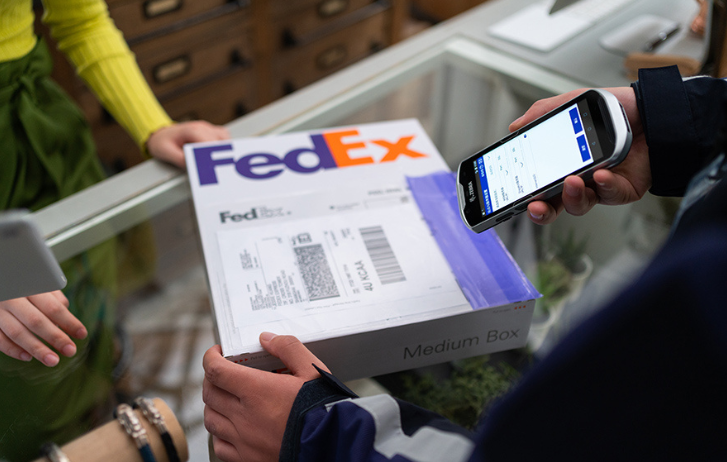
How New, Experimental Tech Powers E-Commerce In China
By FedEx | First published: April 16, 2024 Updated: March 28, 2025
From virtual avatars and GenAI tools to quantum computing, discover the emerging tech trends shaping the future of e-commerce in China.
- Emerging technologies in e-commerce are driving the latest wave of innovation for China’s e-tailers.
- In Chinese e-commerce, AI tools are being deployed to improve the buyer-seller experience across almost every area.
- From AI livestream hosts to quantum computing, check out the emerging trends that matter in today’s e-tail landscape.
Forget what you know about online shopping. The future of e-commerce is driven by new, emerging tech, and China is leading the way. For years, brands have been using virtual sellers to host livestreams, and today, they’re augmenting the experience with a host of AI tools to help reach customers.
These emerging technologies are empowering e-commerce players in China to create a superior, more engaging user experience for businesses and consumers.
Here’s a breakdown of the latest tech trends disrupting China’s e-commerce industry:
1. The rise of virtual livestream hosts
Livestream e-commerce continues to gain popularity in China, reshaping how people discover and purchase products. Major players like Taobao, a well-established e-commerce platform, and Douyin, the Chinese equivalent of TikTok, dominate the scene.
This rapidly growing market offers an ever-expanding array of products across industries, fueling sales volumes.
Livestreaming began as a niche form of shoppertainment in the early 2010s, and has since exploded into a massive industry with about 833 million shoppers. It’s estimated that China’s livestream e-commerce market will reach RMB 8.16 trillion by 2026.
On top of that – and to get ahead of the endless competition - companies have embraced new technologies to take livestream e-commerce to the next level. One exciting development is the rise of virtual hosts and avatars.
For example, Chinese tech giants Tencent and Baidu have launched their own virtual human livestream products, capitalizing on the increasing popularity and demand for digital personalities. They offer a compelling alternative to traditional livestream influencers, reducing costs and mitigating risks associated with partnering with human personalities.
Against a recent backdrop of livestream influencer controversies, AI or virtual livestreamers can offer more control – but brands need to be careful to retain the human-centric touch and unique personalities that buyers respond to.
2. Using AI tools in e-commerce
Following the lead of mega-retailers like Walmart and Amazon, Chinese e-commerce companies have started exploring the potential of AI to boost sales. Chinese e-commerce giant Alibaba Group is using large language models (LLMs) on domestic platforms, Taobao and Tmall, to improve the user experience for shoppers, while boosting operational efficiency for its e-commerce merchants.
The company’s AI tools include "Hui Wa", which enables merchants to create customized text and graphics for marketing and promotional campaigns. In addition, "Taobao Wenwen" provides consumers with a virtual personal shopping assistant that offers recommendations, product details, and more.
Douyin is also making waves with its designated digital marketing platform, Ocean Engine. In 2023, it launched “Jichuang”, a tool specifically designed to assist e-commerce businesses with content creation. Jichuang can generate product descriptions and scripts for short videos, saving merchants valuable time and resources.
3. Testing quantum e-commerce in China
Aside from boosting sales, new tech is enabling more secure shopping transactions through quantum communication. This technology boasts inherent security advantages, potentially making online shopping transactions less hackable.



Recently, the first unhackable shopping transaction was carried out on the quantum internet: a milestone in online security. Companies like IBM and Google are building small-scale quantum networks with a small number of connected quantum computers.
Quantum networks leverage the unique properties of light particles to create an ultra-secure communication channel between merchants and buyers. This development paves the way for a future where shoppers’ data will reach unprecedented levels of protection.
4. Tackling logistics challenges with digital innovation
New tech plays a crucial role in providing value-added services, including logistics. With cloud-based SaaS solutions, merchants can achieve data interconnectivity between cross-border e-commerce platforms and logistics service providers.



This allows them to automate tasks like order processing, goods transportation, and waybill management using the same account across platforms. These cloud solutions improve delivery efficiency and help create a smoother path for expanding into overseas markets.
For merchants already using FedEx, existing programs like the FedEx Compatible and Alliances program simplify the process further. E-tailers can use their existing FedEx account numbers to access a variety of logistics solutions directly within their e-commerce platform, making way for faster, more cost-effective international shipping.
SHARE THIS STORY
- How To Ship A Giant Panda
- How To Make Freight Shipments Work For Your Small Business
- The Rise Of Intra-Asia Trade: Opportunities In The China-Southeast Asia Corridor
- Southeast Asia's Role In Global Manufacturing Supply Chains
- 8 Most Unusual Shipments In The History Of FedEx
- Where Do Old Planes Go When They Retire?
Sign up now and save on your shipping rates!
Sign up now and earn discounts by shipping instantly with FedEx Ship ManagerTM at fedex.com.
Recommended For You

Shoppertainment: How To Tap Into This Growing Trend
Shoppertainment is predicted to transform the e-commerce industry and how we shop, especially in Asia Pacific.
Read More
How China’s Airport Economic Zones Are Propelling SME Growth
Airport Economic Zones are driving cross-border trade across China and beyond. We dive into how airport ecosystems are powering trade and SME growth.
Read More
How Going Digital Fueled Growth For A Chinese Sportswear SME
Women entrepreneurship is on the rise in China, where female-owned online businesses like Musesonly are driving e-commerce growth and innovation.
Read More

